Global Leadership and Cross-Cultural Management: An Evaluation Essay
VerifiedAdded on 2023/06/12
|8
|2437
|322
Essay
AI Summary
This essay critically examines the role of cross-cultural management in evaluating global leadership, drawing upon the article "From cross-cultural management to global leadership: Evolution and adaptation." It discusses the evolution of global leadership trends within cross-cultural management, highlighting the significance of cultural intelligence and adaptability in modern leadership plans. The essay explores unicultural, comparative, and intercultural research approaches, emphasizing the challenges and efforts in merging diverse cultures within global business environments. It references Hofstede's cultural dimensions and analyzes the impact of national cultures on international business negotiations. Furthermore, the essay evaluates the strengths and limitations of cross-cultural management studies, particularly concerning Western-centric perspectives and inconsistencies in empirical evidence, ultimately concluding with the importance of cultural knowledge and training in multinational companies and global leadership development. Desklib offers a wealth of similar resources for students.
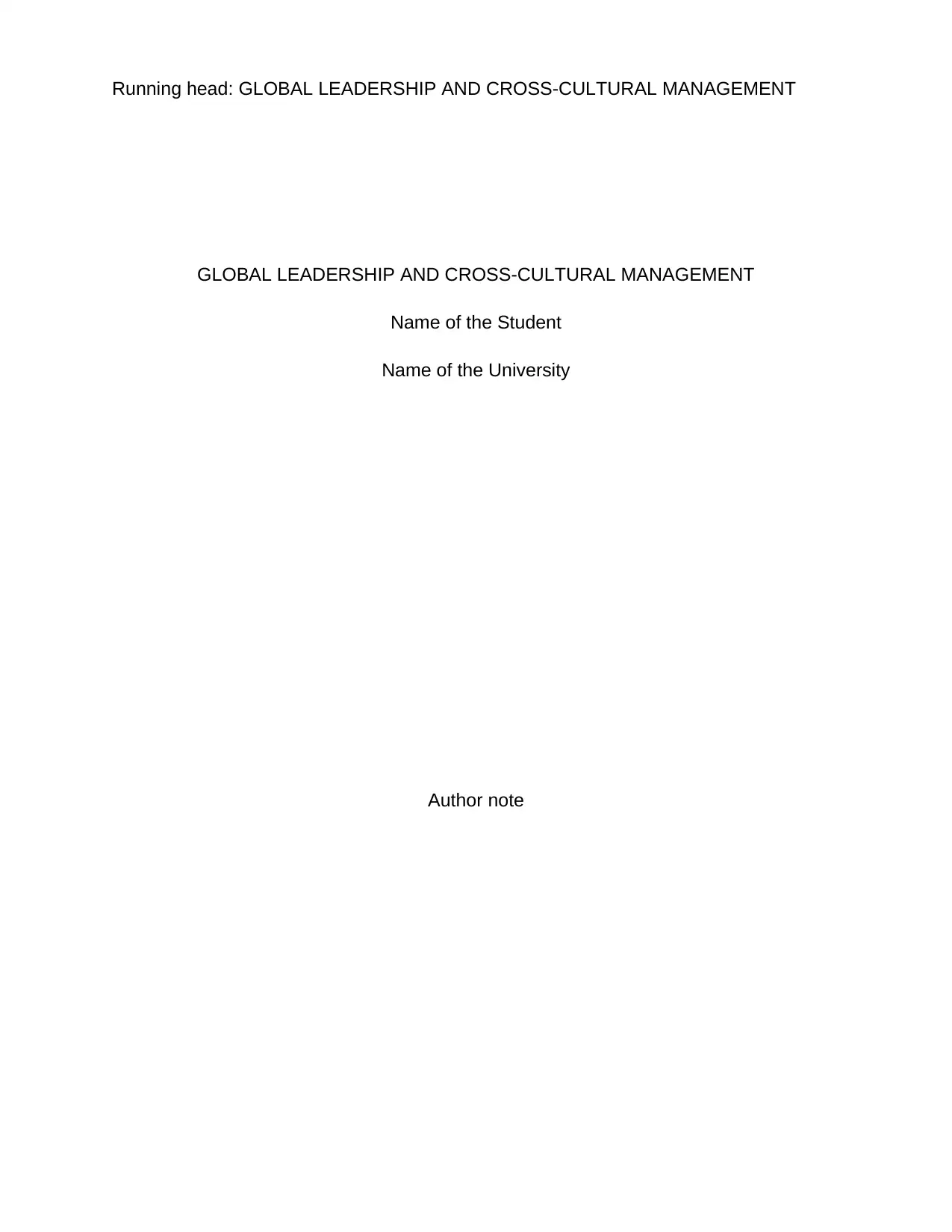
Running head: GLOBAL LEADERSHIP AND CROSS-CULTURAL MANAGEMENT
GLOBAL LEADERSHIP AND CROSS-CULTURAL MANAGEMENT
Name of the Student
Name of the University
Author note
GLOBAL LEADERSHIP AND CROSS-CULTURAL MANAGEMENT
Name of the Student
Name of the University
Author note
Paraphrase This Document
Need a fresh take? Get an instant paraphrase of this document with our AI Paraphraser
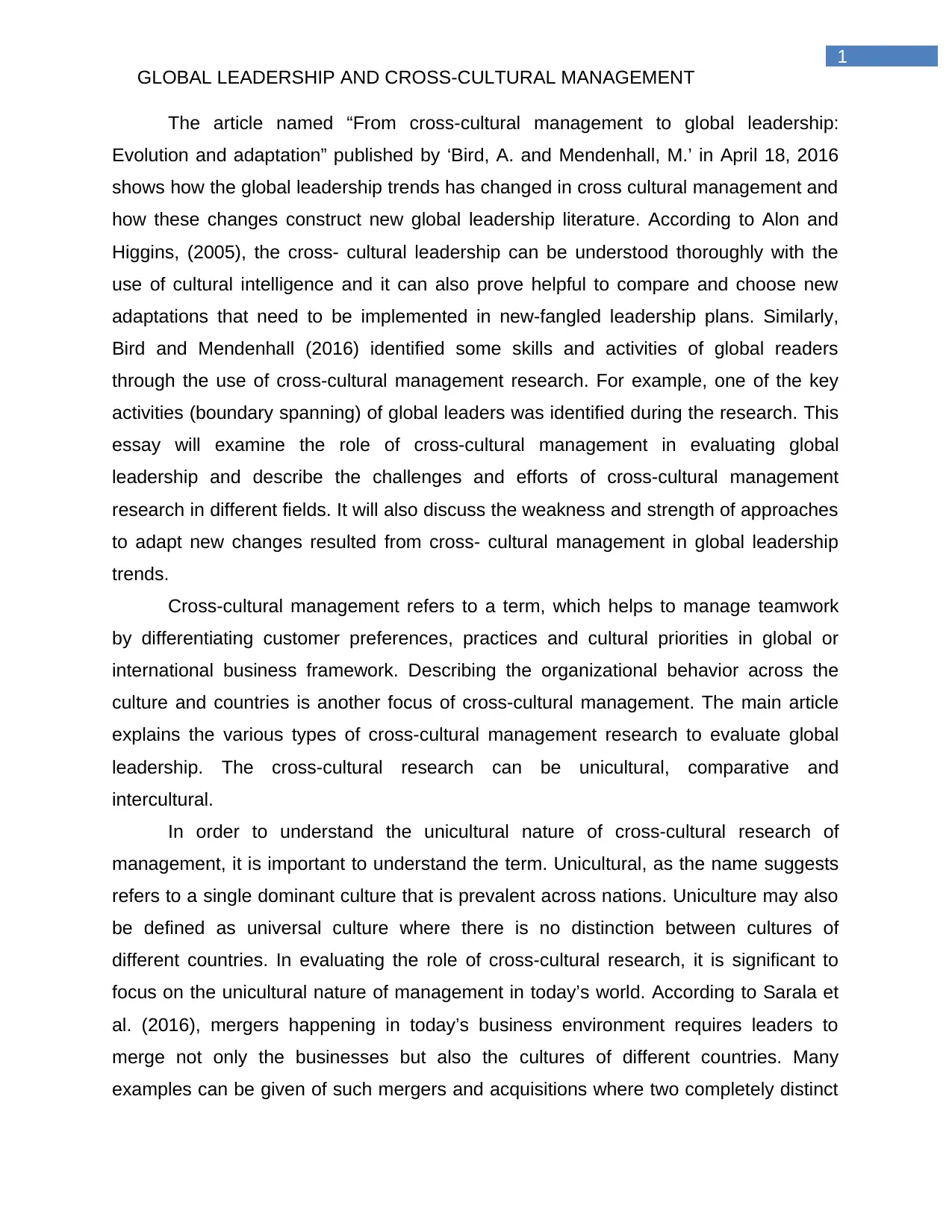
1
GLOBAL LEADERSHIP AND CROSS-CULTURAL MANAGEMENT
The article named “From cross-cultural management to global leadership:
Evolution and adaptation” published by ‘Bird, A. and Mendenhall, M.’ in April 18, 2016
shows how the global leadership trends has changed in cross cultural management and
how these changes construct new global leadership literature. According to Alon and
Higgins, (2005), the cross- cultural leadership can be understood thoroughly with the
use of cultural intelligence and it can also prove helpful to compare and choose new
adaptations that need to be implemented in new-fangled leadership plans. Similarly,
Bird and Mendenhall (2016) identified some skills and activities of global readers
through the use of cross-cultural management research. For example, one of the key
activities (boundary spanning) of global leaders was identified during the research. This
essay will examine the role of cross-cultural management in evaluating global
leadership and describe the challenges and efforts of cross-cultural management
research in different fields. It will also discuss the weakness and strength of approaches
to adapt new changes resulted from cross- cultural management in global leadership
trends.
Cross-cultural management refers to a term, which helps to manage teamwork
by differentiating customer preferences, practices and cultural priorities in global or
international business framework. Describing the organizational behavior across the
culture and countries is another focus of cross-cultural management. The main article
explains the various types of cross-cultural management research to evaluate global
leadership. The cross-cultural research can be unicultural, comparative and
intercultural.
In order to understand the unicultural nature of cross-cultural research of
management, it is important to understand the term. Unicultural, as the name suggests
refers to a single dominant culture that is prevalent across nations. Uniculture may also
be defined as universal culture where there is no distinction between cultures of
different countries. In evaluating the role of cross-cultural research, it is significant to
focus on the unicultural nature of management in today’s world. According to Sarala et
al. (2016), mergers happening in today’s business environment requires leaders to
merge not only the businesses but also the cultures of different countries. Many
examples can be given of such mergers and acquisitions where two completely distinct
GLOBAL LEADERSHIP AND CROSS-CULTURAL MANAGEMENT
The article named “From cross-cultural management to global leadership:
Evolution and adaptation” published by ‘Bird, A. and Mendenhall, M.’ in April 18, 2016
shows how the global leadership trends has changed in cross cultural management and
how these changes construct new global leadership literature. According to Alon and
Higgins, (2005), the cross- cultural leadership can be understood thoroughly with the
use of cultural intelligence and it can also prove helpful to compare and choose new
adaptations that need to be implemented in new-fangled leadership plans. Similarly,
Bird and Mendenhall (2016) identified some skills and activities of global readers
through the use of cross-cultural management research. For example, one of the key
activities (boundary spanning) of global leaders was identified during the research. This
essay will examine the role of cross-cultural management in evaluating global
leadership and describe the challenges and efforts of cross-cultural management
research in different fields. It will also discuss the weakness and strength of approaches
to adapt new changes resulted from cross- cultural management in global leadership
trends.
Cross-cultural management refers to a term, which helps to manage teamwork
by differentiating customer preferences, practices and cultural priorities in global or
international business framework. Describing the organizational behavior across the
culture and countries is another focus of cross-cultural management. The main article
explains the various types of cross-cultural management research to evaluate global
leadership. The cross-cultural research can be unicultural, comparative and
intercultural.
In order to understand the unicultural nature of cross-cultural research of
management, it is important to understand the term. Unicultural, as the name suggests
refers to a single dominant culture that is prevalent across nations. Uniculture may also
be defined as universal culture where there is no distinction between cultures of
different countries. In evaluating the role of cross-cultural research, it is significant to
focus on the unicultural nature of management in today’s world. According to Sarala et
al. (2016), mergers happening in today’s business environment requires leaders to
merge not only the businesses but also the cultures of different countries. Many
examples can be given of such mergers and acquisitions where two completely distinct
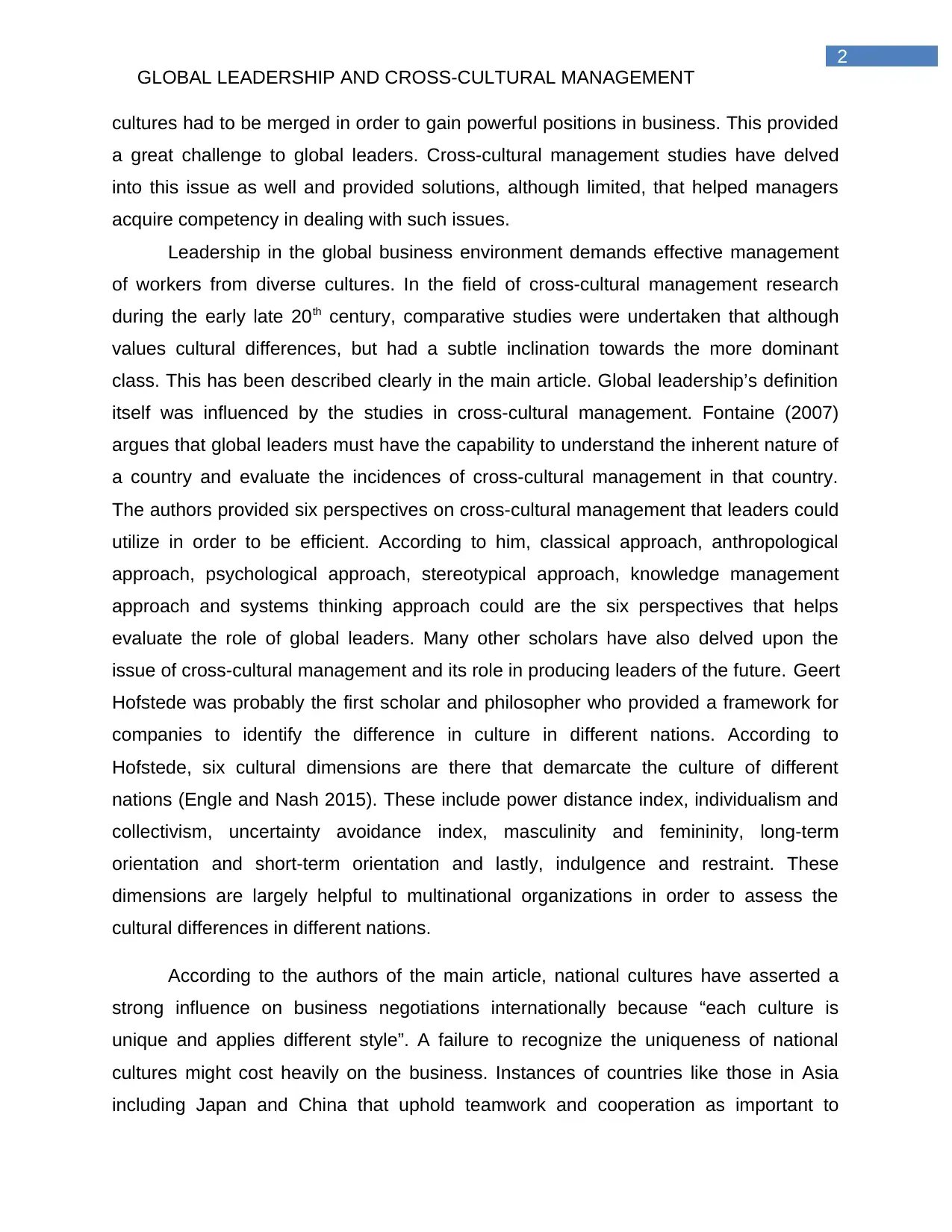
2
GLOBAL LEADERSHIP AND CROSS-CULTURAL MANAGEMENT
cultures had to be merged in order to gain powerful positions in business. This provided
a great challenge to global leaders. Cross-cultural management studies have delved
into this issue as well and provided solutions, although limited, that helped managers
acquire competency in dealing with such issues.
Leadership in the global business environment demands effective management
of workers from diverse cultures. In the field of cross-cultural management research
during the early late 20th century, comparative studies were undertaken that although
values cultural differences, but had a subtle inclination towards the more dominant
class. This has been described clearly in the main article. Global leadership’s definition
itself was influenced by the studies in cross-cultural management. Fontaine (2007)
argues that global leaders must have the capability to understand the inherent nature of
a country and evaluate the incidences of cross-cultural management in that country.
The authors provided six perspectives on cross-cultural management that leaders could
utilize in order to be efficient. According to him, classical approach, anthropological
approach, psychological approach, stereotypical approach, knowledge management
approach and systems thinking approach could are the six perspectives that helps
evaluate the role of global leaders. Many other scholars have also delved upon the
issue of cross-cultural management and its role in producing leaders of the future. Geert
Hofstede was probably the first scholar and philosopher who provided a framework for
companies to identify the difference in culture in different nations. According to
Hofstede, six cultural dimensions are there that demarcate the culture of different
nations (Engle and Nash 2015). These include power distance index, individualism and
collectivism, uncertainty avoidance index, masculinity and femininity, long-term
orientation and short-term orientation and lastly, indulgence and restraint. These
dimensions are largely helpful to multinational organizations in order to assess the
cultural differences in different nations.
According to the authors of the main article, national cultures have asserted a
strong influence on business negotiations internationally because “each culture is
unique and applies different style”. A failure to recognize the uniqueness of national
cultures might cost heavily on the business. Instances of countries like those in Asia
including Japan and China that uphold teamwork and cooperation as important to
GLOBAL LEADERSHIP AND CROSS-CULTURAL MANAGEMENT
cultures had to be merged in order to gain powerful positions in business. This provided
a great challenge to global leaders. Cross-cultural management studies have delved
into this issue as well and provided solutions, although limited, that helped managers
acquire competency in dealing with such issues.
Leadership in the global business environment demands effective management
of workers from diverse cultures. In the field of cross-cultural management research
during the early late 20th century, comparative studies were undertaken that although
values cultural differences, but had a subtle inclination towards the more dominant
class. This has been described clearly in the main article. Global leadership’s definition
itself was influenced by the studies in cross-cultural management. Fontaine (2007)
argues that global leaders must have the capability to understand the inherent nature of
a country and evaluate the incidences of cross-cultural management in that country.
The authors provided six perspectives on cross-cultural management that leaders could
utilize in order to be efficient. According to him, classical approach, anthropological
approach, psychological approach, stereotypical approach, knowledge management
approach and systems thinking approach could are the six perspectives that helps
evaluate the role of global leaders. Many other scholars have also delved upon the
issue of cross-cultural management and its role in producing leaders of the future. Geert
Hofstede was probably the first scholar and philosopher who provided a framework for
companies to identify the difference in culture in different nations. According to
Hofstede, six cultural dimensions are there that demarcate the culture of different
nations (Engle and Nash 2015). These include power distance index, individualism and
collectivism, uncertainty avoidance index, masculinity and femininity, long-term
orientation and short-term orientation and lastly, indulgence and restraint. These
dimensions are largely helpful to multinational organizations in order to assess the
cultural differences in different nations.
According to the authors of the main article, national cultures have asserted a
strong influence on business negotiations internationally because “each culture is
unique and applies different style”. A failure to recognize the uniqueness of national
cultures might cost heavily on the business. Instances of countries like those in Asia
including Japan and China that uphold teamwork and cooperation as important to
⊘ This is a preview!⊘
Do you want full access?
Subscribe today to unlock all pages.

Trusted by 1+ million students worldwide
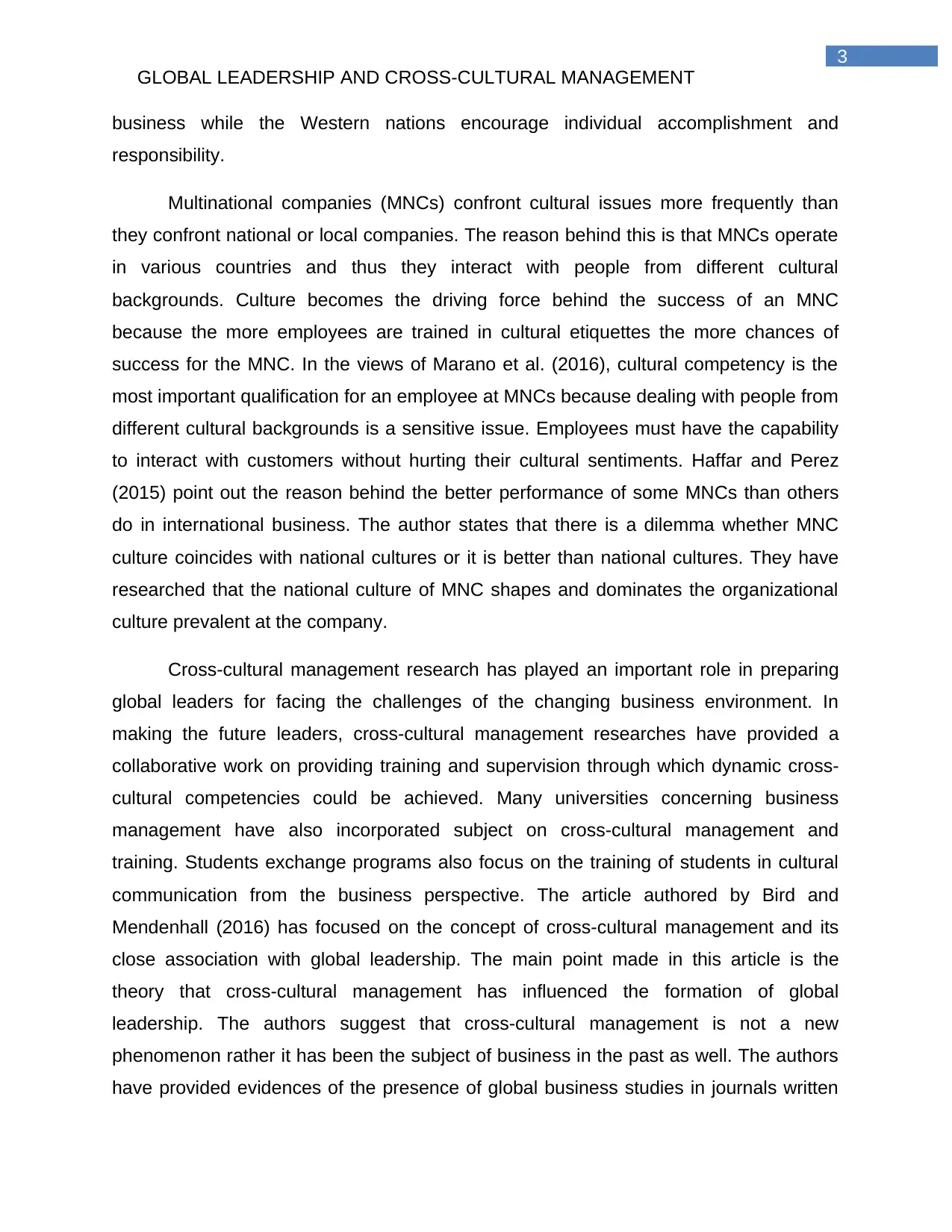
3
GLOBAL LEADERSHIP AND CROSS-CULTURAL MANAGEMENT
business while the Western nations encourage individual accomplishment and
responsibility.
Multinational companies (MNCs) confront cultural issues more frequently than
they confront national or local companies. The reason behind this is that MNCs operate
in various countries and thus they interact with people from different cultural
backgrounds. Culture becomes the driving force behind the success of an MNC
because the more employees are trained in cultural etiquettes the more chances of
success for the MNC. In the views of Marano et al. (2016), cultural competency is the
most important qualification for an employee at MNCs because dealing with people from
different cultural backgrounds is a sensitive issue. Employees must have the capability
to interact with customers without hurting their cultural sentiments. Haffar and Perez
(2015) point out the reason behind the better performance of some MNCs than others
do in international business. The author states that there is a dilemma whether MNC
culture coincides with national cultures or it is better than national cultures. They have
researched that the national culture of MNC shapes and dominates the organizational
culture prevalent at the company.
Cross-cultural management research has played an important role in preparing
global leaders for facing the challenges of the changing business environment. In
making the future leaders, cross-cultural management researches have provided a
collaborative work on providing training and supervision through which dynamic cross-
cultural competencies could be achieved. Many universities concerning business
management have also incorporated subject on cross-cultural management and
training. Students exchange programs also focus on the training of students in cultural
communication from the business perspective. The article authored by Bird and
Mendenhall (2016) has focused on the concept of cross-cultural management and its
close association with global leadership. The main point made in this article is the
theory that cross-cultural management has influenced the formation of global
leadership. The authors suggest that cross-cultural management is not a new
phenomenon rather it has been the subject of business in the past as well. The authors
have provided evidences of the presence of global business studies in journals written
GLOBAL LEADERSHIP AND CROSS-CULTURAL MANAGEMENT
business while the Western nations encourage individual accomplishment and
responsibility.
Multinational companies (MNCs) confront cultural issues more frequently than
they confront national or local companies. The reason behind this is that MNCs operate
in various countries and thus they interact with people from different cultural
backgrounds. Culture becomes the driving force behind the success of an MNC
because the more employees are trained in cultural etiquettes the more chances of
success for the MNC. In the views of Marano et al. (2016), cultural competency is the
most important qualification for an employee at MNCs because dealing with people from
different cultural backgrounds is a sensitive issue. Employees must have the capability
to interact with customers without hurting their cultural sentiments. Haffar and Perez
(2015) point out the reason behind the better performance of some MNCs than others
do in international business. The author states that there is a dilemma whether MNC
culture coincides with national cultures or it is better than national cultures. They have
researched that the national culture of MNC shapes and dominates the organizational
culture prevalent at the company.
Cross-cultural management research has played an important role in preparing
global leaders for facing the challenges of the changing business environment. In
making the future leaders, cross-cultural management researches have provided a
collaborative work on providing training and supervision through which dynamic cross-
cultural competencies could be achieved. Many universities concerning business
management have also incorporated subject on cross-cultural management and
training. Students exchange programs also focus on the training of students in cultural
communication from the business perspective. The article authored by Bird and
Mendenhall (2016) has focused on the concept of cross-cultural management and its
close association with global leadership. The main point made in this article is the
theory that cross-cultural management has influenced the formation of global
leadership. The authors suggest that cross-cultural management is not a new
phenomenon rather it has been the subject of business in the past as well. The authors
have provided evidences of the presence of global business studies in journals written
Paraphrase This Document
Need a fresh take? Get an instant paraphrase of this document with our AI Paraphraser
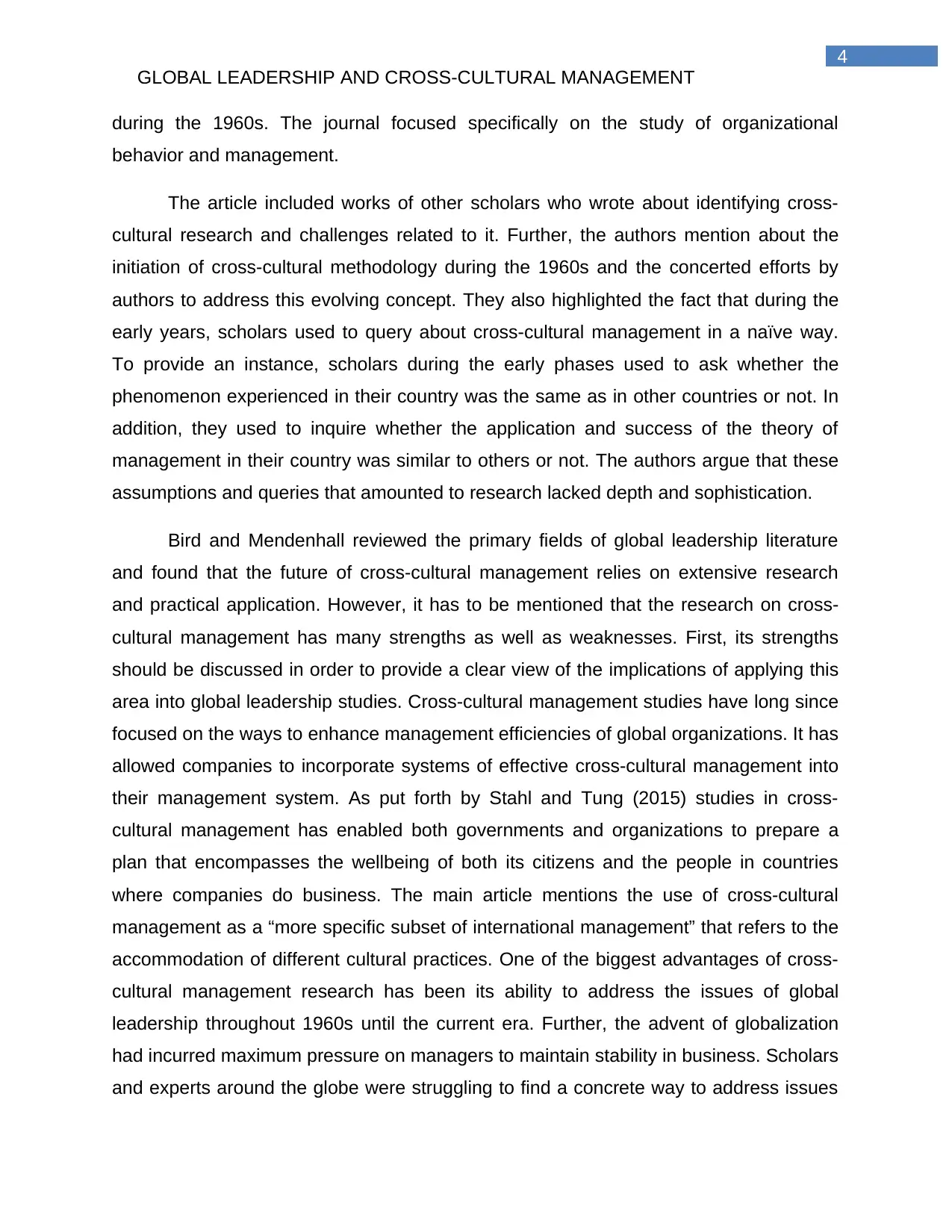
4
GLOBAL LEADERSHIP AND CROSS-CULTURAL MANAGEMENT
during the 1960s. The journal focused specifically on the study of organizational
behavior and management.
The article included works of other scholars who wrote about identifying cross-
cultural research and challenges related to it. Further, the authors mention about the
initiation of cross-cultural methodology during the 1960s and the concerted efforts by
authors to address this evolving concept. They also highlighted the fact that during the
early years, scholars used to query about cross-cultural management in a naïve way.
To provide an instance, scholars during the early phases used to ask whether the
phenomenon experienced in their country was the same as in other countries or not. In
addition, they used to inquire whether the application and success of the theory of
management in their country was similar to others or not. The authors argue that these
assumptions and queries that amounted to research lacked depth and sophistication.
Bird and Mendenhall reviewed the primary fields of global leadership literature
and found that the future of cross-cultural management relies on extensive research
and practical application. However, it has to be mentioned that the research on cross-
cultural management has many strengths as well as weaknesses. First, its strengths
should be discussed in order to provide a clear view of the implications of applying this
area into global leadership studies. Cross-cultural management studies have long since
focused on the ways to enhance management efficiencies of global organizations. It has
allowed companies to incorporate systems of effective cross-cultural management into
their management system. As put forth by Stahl and Tung (2015) studies in cross-
cultural management has enabled both governments and organizations to prepare a
plan that encompasses the wellbeing of both its citizens and the people in countries
where companies do business. The main article mentions the use of cross-cultural
management as a “more specific subset of international management” that refers to the
accommodation of different cultural practices. One of the biggest advantages of cross-
cultural management research has been its ability to address the issues of global
leadership throughout 1960s until the current era. Further, the advent of globalization
had incurred maximum pressure on managers to maintain stability in business. Scholars
and experts around the globe were struggling to find a concrete way to address issues
GLOBAL LEADERSHIP AND CROSS-CULTURAL MANAGEMENT
during the 1960s. The journal focused specifically on the study of organizational
behavior and management.
The article included works of other scholars who wrote about identifying cross-
cultural research and challenges related to it. Further, the authors mention about the
initiation of cross-cultural methodology during the 1960s and the concerted efforts by
authors to address this evolving concept. They also highlighted the fact that during the
early years, scholars used to query about cross-cultural management in a naïve way.
To provide an instance, scholars during the early phases used to ask whether the
phenomenon experienced in their country was the same as in other countries or not. In
addition, they used to inquire whether the application and success of the theory of
management in their country was similar to others or not. The authors argue that these
assumptions and queries that amounted to research lacked depth and sophistication.
Bird and Mendenhall reviewed the primary fields of global leadership literature
and found that the future of cross-cultural management relies on extensive research
and practical application. However, it has to be mentioned that the research on cross-
cultural management has many strengths as well as weaknesses. First, its strengths
should be discussed in order to provide a clear view of the implications of applying this
area into global leadership studies. Cross-cultural management studies have long since
focused on the ways to enhance management efficiencies of global organizations. It has
allowed companies to incorporate systems of effective cross-cultural management into
their management system. As put forth by Stahl and Tung (2015) studies in cross-
cultural management has enabled both governments and organizations to prepare a
plan that encompasses the wellbeing of both its citizens and the people in countries
where companies do business. The main article mentions the use of cross-cultural
management as a “more specific subset of international management” that refers to the
accommodation of different cultural practices. One of the biggest advantages of cross-
cultural management research has been its ability to address the issues of global
leadership throughout 1960s until the current era. Further, the advent of globalization
had incurred maximum pressure on managers to maintain stability in business. Scholars
and experts around the globe were struggling to find a concrete way to address issues
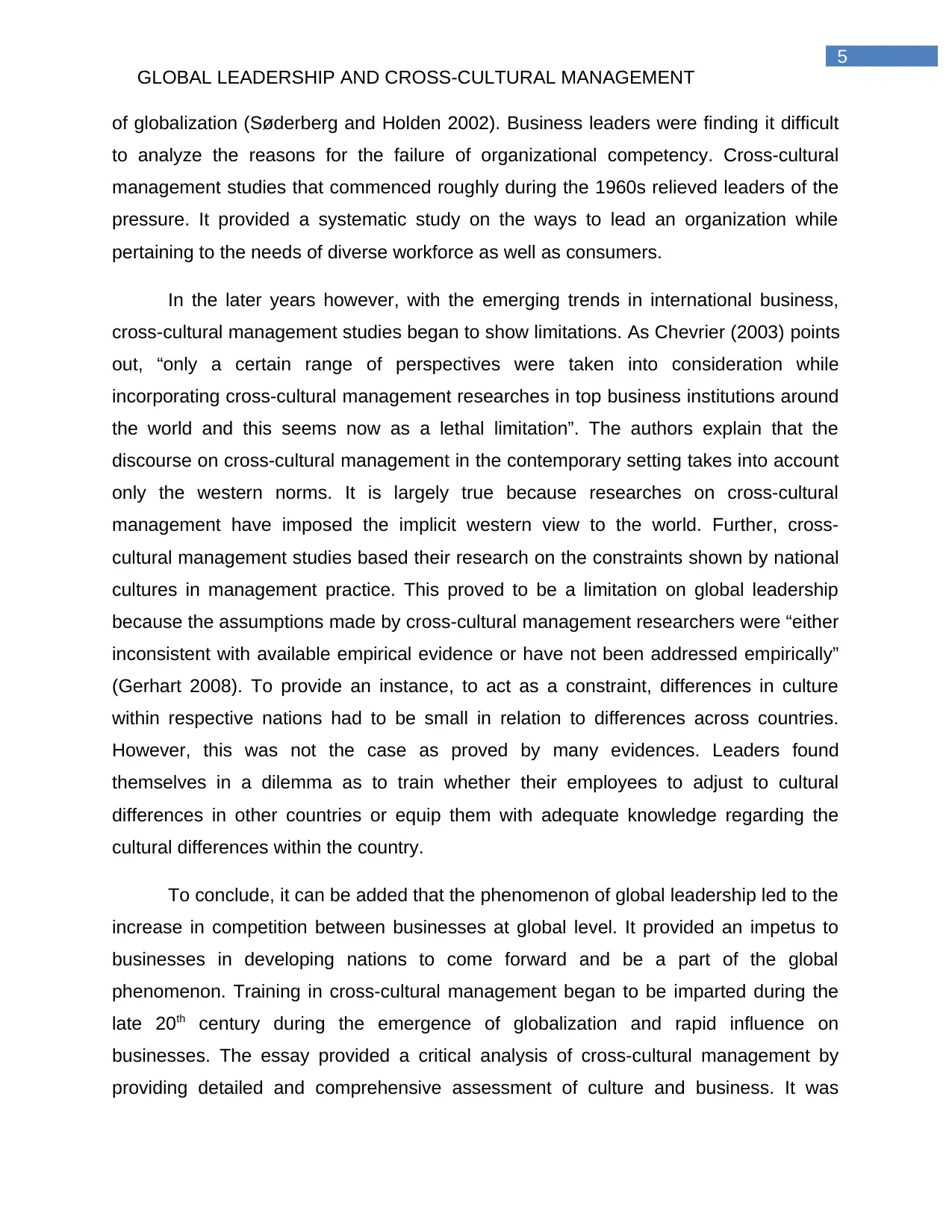
5
GLOBAL LEADERSHIP AND CROSS-CULTURAL MANAGEMENT
of globalization (Søderberg and Holden 2002). Business leaders were finding it difficult
to analyze the reasons for the failure of organizational competency. Cross-cultural
management studies that commenced roughly during the 1960s relieved leaders of the
pressure. It provided a systematic study on the ways to lead an organization while
pertaining to the needs of diverse workforce as well as consumers.
In the later years however, with the emerging trends in international business,
cross-cultural management studies began to show limitations. As Chevrier (2003) points
out, “only a certain range of perspectives were taken into consideration while
incorporating cross-cultural management researches in top business institutions around
the world and this seems now as a lethal limitation”. The authors explain that the
discourse on cross-cultural management in the contemporary setting takes into account
only the western norms. It is largely true because researches on cross-cultural
management have imposed the implicit western view to the world. Further, cross-
cultural management studies based their research on the constraints shown by national
cultures in management practice. This proved to be a limitation on global leadership
because the assumptions made by cross-cultural management researchers were “either
inconsistent with available empirical evidence or have not been addressed empirically”
(Gerhart 2008). To provide an instance, to act as a constraint, differences in culture
within respective nations had to be small in relation to differences across countries.
However, this was not the case as proved by many evidences. Leaders found
themselves in a dilemma as to train whether their employees to adjust to cultural
differences in other countries or equip them with adequate knowledge regarding the
cultural differences within the country.
To conclude, it can be added that the phenomenon of global leadership led to the
increase in competition between businesses at global level. It provided an impetus to
businesses in developing nations to come forward and be a part of the global
phenomenon. Training in cross-cultural management began to be imparted during the
late 20th century during the emergence of globalization and rapid influence on
businesses. The essay provided a critical analysis of cross-cultural management by
providing detailed and comprehensive assessment of culture and business. It was
GLOBAL LEADERSHIP AND CROSS-CULTURAL MANAGEMENT
of globalization (Søderberg and Holden 2002). Business leaders were finding it difficult
to analyze the reasons for the failure of organizational competency. Cross-cultural
management studies that commenced roughly during the 1960s relieved leaders of the
pressure. It provided a systematic study on the ways to lead an organization while
pertaining to the needs of diverse workforce as well as consumers.
In the later years however, with the emerging trends in international business,
cross-cultural management studies began to show limitations. As Chevrier (2003) points
out, “only a certain range of perspectives were taken into consideration while
incorporating cross-cultural management researches in top business institutions around
the world and this seems now as a lethal limitation”. The authors explain that the
discourse on cross-cultural management in the contemporary setting takes into account
only the western norms. It is largely true because researches on cross-cultural
management have imposed the implicit western view to the world. Further, cross-
cultural management studies based their research on the constraints shown by national
cultures in management practice. This proved to be a limitation on global leadership
because the assumptions made by cross-cultural management researchers were “either
inconsistent with available empirical evidence or have not been addressed empirically”
(Gerhart 2008). To provide an instance, to act as a constraint, differences in culture
within respective nations had to be small in relation to differences across countries.
However, this was not the case as proved by many evidences. Leaders found
themselves in a dilemma as to train whether their employees to adjust to cultural
differences in other countries or equip them with adequate knowledge regarding the
cultural differences within the country.
To conclude, it can be added that the phenomenon of global leadership led to the
increase in competition between businesses at global level. It provided an impetus to
businesses in developing nations to come forward and be a part of the global
phenomenon. Training in cross-cultural management began to be imparted during the
late 20th century during the emergence of globalization and rapid influence on
businesses. The essay provided a critical analysis of cross-cultural management by
providing detailed and comprehensive assessment of culture and business. It was
⊘ This is a preview!⊘
Do you want full access?
Subscribe today to unlock all pages.

Trusted by 1+ million students worldwide
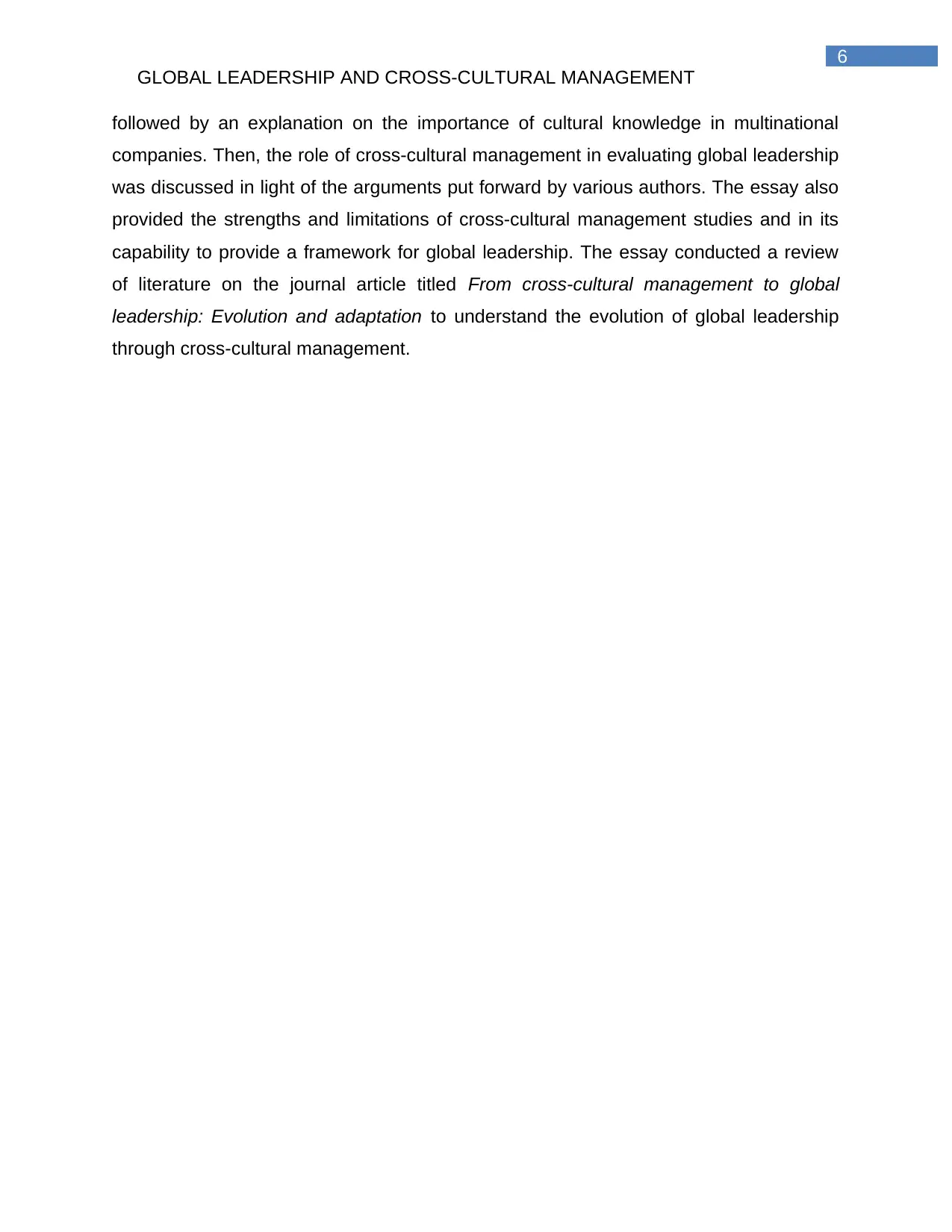
6
GLOBAL LEADERSHIP AND CROSS-CULTURAL MANAGEMENT
followed by an explanation on the importance of cultural knowledge in multinational
companies. Then, the role of cross-cultural management in evaluating global leadership
was discussed in light of the arguments put forward by various authors. The essay also
provided the strengths and limitations of cross-cultural management studies and in its
capability to provide a framework for global leadership. The essay conducted a review
of literature on the journal article titled From cross-cultural management to global
leadership: Evolution and adaptation to understand the evolution of global leadership
through cross-cultural management.
GLOBAL LEADERSHIP AND CROSS-CULTURAL MANAGEMENT
followed by an explanation on the importance of cultural knowledge in multinational
companies. Then, the role of cross-cultural management in evaluating global leadership
was discussed in light of the arguments put forward by various authors. The essay also
provided the strengths and limitations of cross-cultural management studies and in its
capability to provide a framework for global leadership. The essay conducted a review
of literature on the journal article titled From cross-cultural management to global
leadership: Evolution and adaptation to understand the evolution of global leadership
through cross-cultural management.
Paraphrase This Document
Need a fresh take? Get an instant paraphrase of this document with our AI Paraphraser
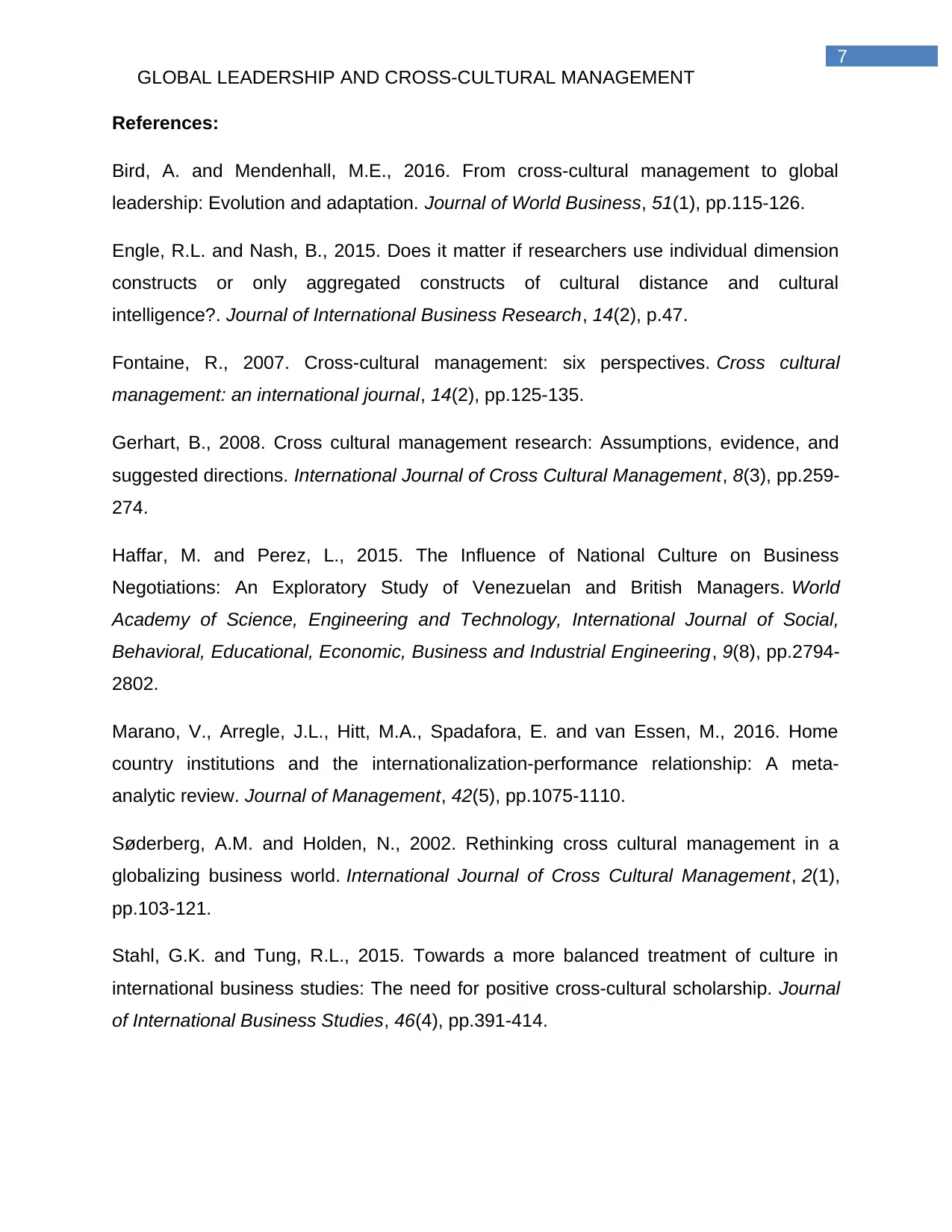
7
GLOBAL LEADERSHIP AND CROSS-CULTURAL MANAGEMENT
References:
Bird, A. and Mendenhall, M.E., 2016. From cross-cultural management to global
leadership: Evolution and adaptation. Journal of World Business, 51(1), pp.115-126.
Engle, R.L. and Nash, B., 2015. Does it matter if researchers use individual dimension
constructs or only aggregated constructs of cultural distance and cultural
intelligence?. Journal of International Business Research, 14(2), p.47.
Fontaine, R., 2007. Cross-cultural management: six perspectives. Cross cultural
management: an international journal, 14(2), pp.125-135.
Gerhart, B., 2008. Cross cultural management research: Assumptions, evidence, and
suggested directions. International Journal of Cross Cultural Management, 8(3), pp.259-
274.
Haffar, M. and Perez, L., 2015. The Influence of National Culture on Business
Negotiations: An Exploratory Study of Venezuelan and British Managers. World
Academy of Science, Engineering and Technology, International Journal of Social,
Behavioral, Educational, Economic, Business and Industrial Engineering, 9(8), pp.2794-
2802.
Marano, V., Arregle, J.L., Hitt, M.A., Spadafora, E. and van Essen, M., 2016. Home
country institutions and the internationalization-performance relationship: A meta-
analytic review. Journal of Management, 42(5), pp.1075-1110.
Søderberg, A.M. and Holden, N., 2002. Rethinking cross cultural management in a
globalizing business world. International Journal of Cross Cultural Management, 2(1),
pp.103-121.
Stahl, G.K. and Tung, R.L., 2015. Towards a more balanced treatment of culture in
international business studies: The need for positive cross-cultural scholarship. Journal
of International Business Studies, 46(4), pp.391-414.
GLOBAL LEADERSHIP AND CROSS-CULTURAL MANAGEMENT
References:
Bird, A. and Mendenhall, M.E., 2016. From cross-cultural management to global
leadership: Evolution and adaptation. Journal of World Business, 51(1), pp.115-126.
Engle, R.L. and Nash, B., 2015. Does it matter if researchers use individual dimension
constructs or only aggregated constructs of cultural distance and cultural
intelligence?. Journal of International Business Research, 14(2), p.47.
Fontaine, R., 2007. Cross-cultural management: six perspectives. Cross cultural
management: an international journal, 14(2), pp.125-135.
Gerhart, B., 2008. Cross cultural management research: Assumptions, evidence, and
suggested directions. International Journal of Cross Cultural Management, 8(3), pp.259-
274.
Haffar, M. and Perez, L., 2015. The Influence of National Culture on Business
Negotiations: An Exploratory Study of Venezuelan and British Managers. World
Academy of Science, Engineering and Technology, International Journal of Social,
Behavioral, Educational, Economic, Business and Industrial Engineering, 9(8), pp.2794-
2802.
Marano, V., Arregle, J.L., Hitt, M.A., Spadafora, E. and van Essen, M., 2016. Home
country institutions and the internationalization-performance relationship: A meta-
analytic review. Journal of Management, 42(5), pp.1075-1110.
Søderberg, A.M. and Holden, N., 2002. Rethinking cross cultural management in a
globalizing business world. International Journal of Cross Cultural Management, 2(1),
pp.103-121.
Stahl, G.K. and Tung, R.L., 2015. Towards a more balanced treatment of culture in
international business studies: The need for positive cross-cultural scholarship. Journal
of International Business Studies, 46(4), pp.391-414.
1 out of 8
Related Documents
Your All-in-One AI-Powered Toolkit for Academic Success.
+13062052269
info@desklib.com
Available 24*7 on WhatsApp / Email
![[object Object]](/_next/static/media/star-bottom.7253800d.svg)
Unlock your academic potential
Copyright © 2020–2026 A2Z Services. All Rights Reserved. Developed and managed by ZUCOL.





